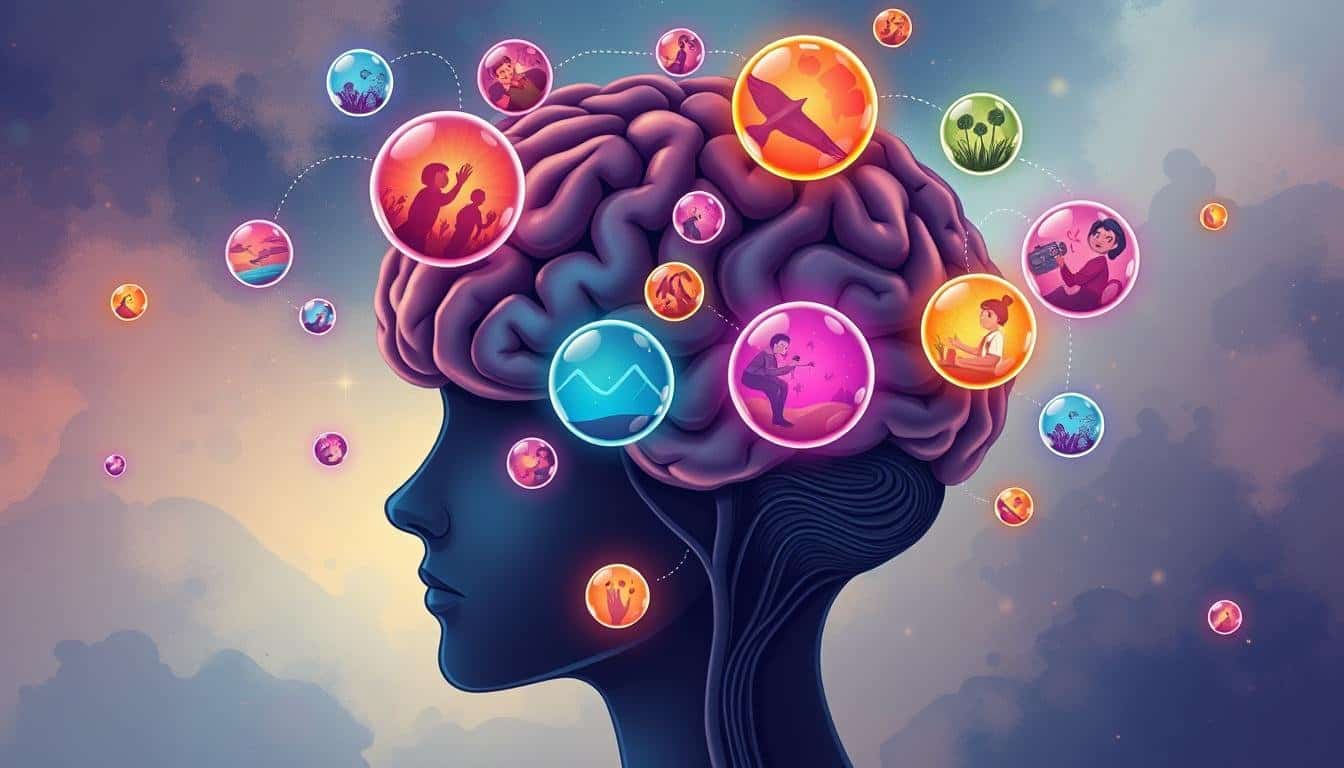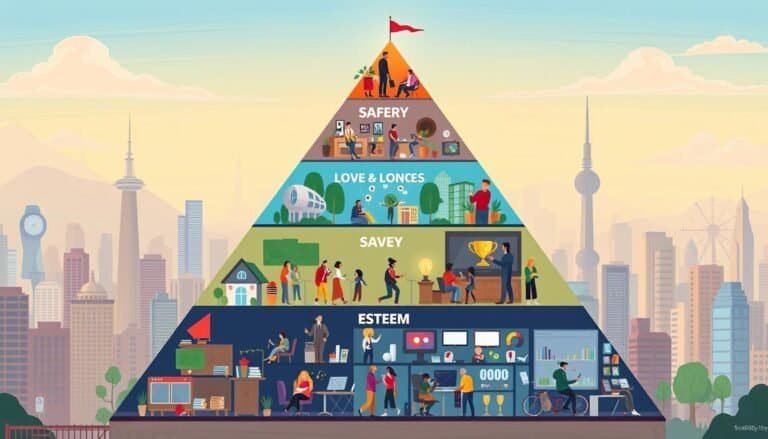Unlock Memory Power with The Self-Reference Effect
Have you ever thought about why some memories stay with you while others disappear? The key is in a cool brain trick called The Self-Reference Effect. This effect shows that we remember things better when they relate to us personally. By connecting new info to our own lives, we can improve our memory a lot. Let’s dive into how the self-reference effect works, its role in brain science, and how it helps us remember stuff better, especially in school. Learning about this can make you better at remembering things in school and life.
Key Takeaways
- The Self-Reference Effect enhances memory recall through personal relevance.
- Research shows self-referential encoding leads to better memory retention compared to traditional encoding.
- People remember information better when it connects to their own life or schemas.
- Comparing oneself to close others can diminish the self-reference effect on memory.
- Negative emotions can weaken the impact of the self-reference effect on memory retention.
Understanding the Self-Reference Effect
The self-reference effect is key in making memories stronger, especially when it comes to remembering things about ourselves. People tend to remember information that is about them better than info about others. This shows how important it is to understand this effect in cognitive psychology and how it helps improve memory.
Definition of The Self-Reference Effect
In cognitive psychology, the self-reference effect means people remember things better when they relate to themselves. Studies show that adding personal experiences to learning makes remembering easier. This shows how using self-related information can greatly improve memory.
Significance in Cognitive Psychology
The self-reference effect does more than just help remember traits or facts. It boosts both specific and general memory, especially how details get stored. Research has found big improvements in remembering various objects and concepts when they are self-related. This shows a deep link between our sense of self and how we remember things.
How The Self-Reference Effect Enhances Memory Recall
The self-reference effect greatly improves memory by linking new info to ourselves. This method makes processing information deeper. A study with 156 students showed that linking info to oneself works better than just memorizing it.
The Mechanism of Self-Referential Encoding
Self-referential encoding helps create detailed mental maps for better memory. When we connect new info to ourselves, we remember it better, especially adjectives and traits. This works for all ages, from young to old. Older people also benefit from this method, just like the young.
Comparison with Other Memory Encoding Techniques
Self-referential encoding stands out when compared to other ways of remembering things. Other methods focus on just memorizing without making it personal. This leads to less effective memory.
| Memory Encoding Techniques | Effectiveness on Recall | Applicable Demographics |
|---|---|---|
| Self-Referential Encoding | High (Enhanced memory traces) | Young and Older Adults |
| Semantic Encoding | Moderate | General Population |
| Rote Memorization | Low | General Population |
Self-referential encoding boosts memory and makes learning more meaningful. It helps us remember things better and improves our thinking skills.
The Role of Self-Relevance in Memory Formation
Self-relevance plays a big part in how we form and remember memories. When we connect new info to our own lives, we learn better. This link between self-relevance and memory makes us remember things better, especially our personal stories.
Personal Connections and Their Impact on Learning
Personal connections are key in making memories. When we tie new ideas to our own stories or feelings, we make stronger links. This is the self-reference effect, making us remember things better than if we didn’t connect them to ourselves.
Studies show that being personally involved in learning sets apart good learners from others.
Autobiographical Memory and Self-Relevance
Autobiographical memory is all about how our personal stories affect our memory. Research says that our own experiences make memories clearer and more accurate. For example, Craik and Tulving (1975) found that people remember better when info relates to them.
This shows how important it is to process information with ourselves in mind. It helps us encode information deeply, which keeps it in our memory longer.
| Study | Key Findings |
|---|---|
| Craik and Tulving (1975) | Memory improves when information is processed for relevance to the self. |
| Rey (1983) | Self-referent questioning significantly enhances memory formation. |
| Craik and Lockhart (1972) | Deeper processing leads to better retention; self-referential processing is superior. |
| Wang et al. (2019) | Self-reference manipulation affects spontaneous false memory rates. |
Utilizing Self-Referential Encoding in Learning
Effective study techniques can greatly improve memory and understanding. By using self-referential encoding, learners connect new info to their own lives. This makes learning more meaningful and fun. Both teachers and students can learn how to use these strategies well.
Strategies for Effective Study Techniques
To use self-referential encoding, students should try these methods:
- Personal Experiences: Linking new info to personal stories makes it stick better.
- Visualizing Applications: Thinking about how to use the knowledge in real life helps remember it.
- Creating Narratives: Making stories that mix personal and study content boosts engagement.
Creating Personal Connections During Study Sessions
Building personal connections can really help with learning. Students can do this by:
- Using self-cues during study. Seeing how concepts relate to their life deepens understanding.
- Building self-schema with personal goals and values. This links study materials to their dreams.
- Joining discussions to share personal insights about the study topics. This creates a team learning atmosphere.
The Impact of Emotions on The Self-Reference Effect
Emotions greatly affect how well the self-reference effect works. They can make memories stronger or weaker. When learners feel happy, they remember things better. But, feeling sad or upset can make it harder to remember important details.
Positive Emotions and Memory Retention
Happy feelings help keep memories strong. When people are in a good mood, they connect better with what they’re learning. This makes their brains work better when they think about things that matter to them.
Studies show that being happy helps people remember things they find important. This shows that feeling good can make remembering easier.
How Negative Emotions Weaken Memory Recall
Feeling bad can hurt how well we remember things. High anxiety or stress can make it hard to focus on learning. This leads to remembering less.
Bad feelings use the same brain paths as thinking about ourselves, but they don’t help with remembering. Stress makes it tough to connect with what we’re learning.
| Emotion Type | Impact on Memory | Neural Responses |
|---|---|---|
| Positive Emotions | Enhances memory retention | Activation of medial prefrontal cortex |
| Negative Emotions | Weakens memory recall | Distraction leading to impaired processing |
Social Comparison and Memory Recall
Understanding how we compare ourselves to others sheds light on how we remember things. When we compare ourselves to our peers in learning situations, it affects how well we remember our own stuff. Studies show that focusing on how we stack up against others can make us forget our own goals and achievements.
This happens because our feelings and how we see ourselves change when we compare. Our memory can suffer because of this.
The Diminished Effect when Comparing to Peers
When we compare ourselves to others, especially our friends or classmates, it can hurt our memory. Being aware of how others are doing can make it hard to remember our own goals. This is especially true when we’re close to the people we’re comparing ourselves to.
Trying to keep track of others takes a lot of mental effort. This can make it harder to focus on our own goals and remember important details.
Understanding the Psychology Behind Self-Comparison
Comparing ourselves to others is a complex process that affects how we remember things. When we see ourselves as not as good as others, we might feel insecure. These feelings can make it harder to remember new information.
This shows how comparing ourselves to others can hurt our self-esteem and our ability to learn and remember.
| Aspect | Impact on Memory Recall |
|---|---|
| Self-Reference Effect | Enhances memory performance for self-related information. |
| Peer Comparison | Diminishes retrieval of self-referent memories due to emotional interference. |
| Emotional State | Negative emotions can impair memory retention and recall abilities. |
| Type of Information | Self-related information is recalled better than information about others. |
Practical Applications of The Self-Reference Effect
The self-reference effect is key in education and personal growth. It helps people and teachers improve learning and grow personally.
In Educational Settings
Teachers use self-reference to make learning fun and stick in students’ minds. They ask students to link course material to their own lives. This makes learning more meaningful.
A study with 156 undergrads showed better memory for abstract shapes when students thought about their own experiences. This shows how self-reference helps in learning.
- Encouragement to connect educational material to personal anecdotes.
- Utilization of self-cues during the study phase can lead to enhanced memory performance.
- Incorporating reflective exercises that ask students to consider how they relate to the subject matter promotes deeper understanding.
In Personal Development and Growth
The self-reference effect also helps in personal growth. It boosts emotional smarts and self-knowledge. Reflecting on experiences and linking them to personal growth deepens emotional understanding and drives change.
- Encouraging journaling to explore personal feelings and experiences.
- Setting personal goals that align with individual beliefs and values.
- Utilizing visualization techniques to create a vivid connection between aspirations and past experiences.
The Neuroscience Behind The Self-Reference Effect
Our brains work in amazing ways when we think about ourselves. Studies show that thinking about ourselves changes how our brains handle information. Certain parts of the brain light up when we think about our own lives or traits.
Brain Activity and Self-Referential Encoding
A recent study looked at 18 healthy Japanese people. They used a task to see how the brain works when we think about ourselves. Participants looked at 300 words that described traits, some good and some not so good.
This helped researchers understand how we process info about ourselves. They found that our brains work best when we think about traits that fit us. This shows we really want to remember who we are.
Default Mode Network and Memory Processing
The default mode network is key in how we remember things related to ourselves. It’s very active when we think about our past or ourselves. This network helps us remember things about ourselves better.
Culture also affects how we remember things. In Japan, people who are more altruistic might remember things differently. This shows that our culture and personal traits can change how we remember things.
Case Studies Supporting The Self-Reference Effect
Many studies show how linking information to ourselves boosts memory. They prove that relating info to ourselves helps us remember better. This method works well for people of all ages.
Research Findings in Cognitive Studies
For over 60 years, research has shown that thinking about ourselves helps memory. A study looked at 92 young and 60 older adults. It found that thinking about ourselves improves memory more than other ways.
Brain scans showed that older adults used the same brain areas as younger ones. This means memory works the same way at any age.
Real-Life Implementations and Outcomes
In schools, making learning personal helps students remember better. When students connect with the material, they do better. This shows how useful the self-reference effect can be in education.
It’s a great way to make learning more effective. This approach leads to better results in school.
Challenges and Limitations of The Self-Reference Effect
The self-reference effect helps improve memory, but it’s not perfect. It faces challenges that affect its success. These issues highlight where it might not work well, especially with memory recall and individual differences.
Situations Where It May Not Work Effectively
When people can’t connect with the material, the self-reference effect struggles. Not knowing the subject beforehand can make it hard to relate. Emotional states also matter; strong feelings can block memory making and getting it back, making it harder to recall.
Some mental health conditions, like borderline personality disorder (BPD), add to the problem. People with BPD might find it tough to use self-referential prompts. This can lead to different ways of remembering things.
Overcoming Barriers to Effective Memory Recall
To beat memory recall limits, teachers and students can try different strategies. Starting with a strong base of knowledge helps make self-referential connections easier. Using new info with things you already know or talking about it in a way that gets you involved can help.
Making the material emotionally engaging also boosts memory. Adding stories or encouraging personal reflection can do this. These methods help people get past the hurdles of the self-reference effect and improve their memory.
Conclusion
The self-reference effect is a key way to boost our memory. It shows how our personal experiences and feelings help us remember better. This self-reference effect recap highlights its big benefits, linking closely to who we are.
This method has many uses, from school to personal growth. Even though it might work differently in various cultures, studies show it helps people all over the world. Brain scans have found specific areas that light up when we think about things that matter to us. This shows our memory is more organized and connected to our personal lives.
Using this idea can help us use our memory better. It’s especially useful for students and anyone who wants to learn more. With lots of research supporting it, the self-reference effect is a great way to improve our memory skills.







